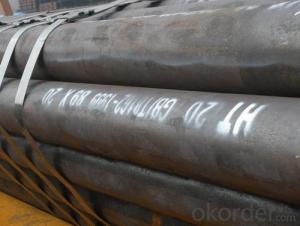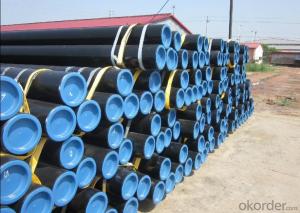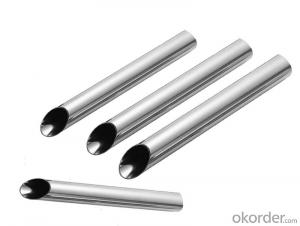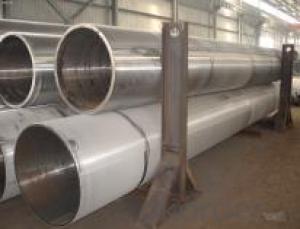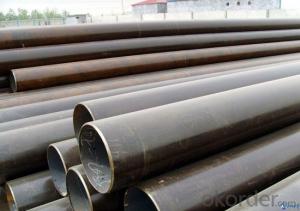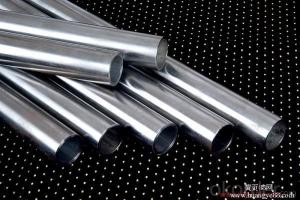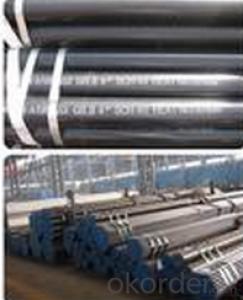Steel pipe for carbon seamless ,APIJ55, CNBM
- Loading Port:
- Qingdao
- Payment Terms:
- TT OR LC
- Min Order Qty:
- 10 pc
- Supply Capability:
- 30 pc/month
OKorder Service Pledge
OKorder Financial Service
You Might Also Like
Quick Details
Thickness: 6 - 50 mm Section
Shape: Round,r
Outer Diameter: 33 - 600 mm
Secondary Or Not: Non-secondary
Application: Fluid Pipe
Technique: Hot Rolled,Hot Rolled,Cold Drawn,Hot Expanded Certification: API Surface Treatment: Beveled end or plain end or varnished as per buyer
Special Pipe: API Pipe Alloy Or Not: Non-alloy
Brand Name: XPY(Xinpengyuan)
Length: 6-12m or according to clients' requirements
Standard: BS 3059-2,JIS G3454-2007,GB 5310-1995,GB 3087-1999,GB/T 8163-1999,GB/T 8162-1999,GB 6479-2000,DIN 1629/3,DIN 2448,ASTM A106-2006,ASTM A53-2007,API 5CT,API 5L,BS,JIS,GB,DIN,ASTM,API
Bundles or loose, each bundles with 8 steel strips and
nylon slings wrapped with water proof plastic cloth.
We also pack our products according to customer’s requirement
- Q: Can steel pipes be used for architectural purposes?
- Yes, steel pipes can be used for architectural purposes. Steel pipes are often used in construction projects for structural support, such as in the construction of buildings, bridges, and stadiums. They are also commonly used for architectural design elements, such as handrails, staircases, and decorative features. The durability, strength, and versatility of steel pipes make them a popular choice in architectural applications.
- Q: Can steel pipes be used for conveying steam?
- Yes, steel pipes can be used for conveying steam. Steel pipes are commonly used in steam systems due to their high strength and durability, as well as their ability to withstand high temperature and pressure conditions. However, it is important to ensure that the steel pipes are properly insulated and the system is adequately designed to prevent any potential issues such as corrosion or thermal expansion.
- Q: What are the different testing methods for steel pipes?
- Some of the different testing methods for steel pipes include non-destructive testing methods such as ultrasonic testing, magnetic particle testing, and radiographic testing. These methods are used to detect any defects or inconsistencies in the pipe's structure or material without causing any damage. Other testing methods include hydrostatic testing, which involves pressurizing the pipe with water to check for leaks or weaknesses, and mechanical testing, which measures the pipe's strength and durability through tensile, hardness, and impact tests.
- Q: How are steel pipes used in the manufacturing of chemical storage tanks?
- Steel pipes are used in the manufacturing of chemical storage tanks for their durability, strength, and resistance to corrosion. These pipes are utilized for the construction of the tank's framework, as well as for the transport of chemicals within the tank. The steel pipes provide a reliable and secure infrastructure, ensuring the safety and integrity of the chemicals stored inside the tank.
- Q: Can steel pipes be used for transporting drinking water?
- Yes, steel pipes can be used for transporting drinking water. However, it is important to ensure that the steel pipes are properly coated and protected to prevent any corrosion or leaching that could contaminate the water. Additionally, regular maintenance and monitoring of water quality should be conducted to ensure the safety of the drinking water.
- Q: What is the maximum bending radius for steel pipes?
- The maximum bending radius for steel pipes is determined by several factors, including the diameter of the pipe, the thickness of its walls, and the specific type of steel used. In general, pipes with larger diameters and thicker walls will have a greater maximum bending radius. However, it is crucial to adhere to industry standards and guidelines to ensure that the structural integrity of the pipe remains intact during the bending process. To obtain precise details regarding the maximum bending radius for steel pipes in various applications, it is recommended to consult the manufacturer's specifications or refer to relevant codes and standards, such as the American Society of Mechanical Engineers (ASME) B31.1 or B31.3.
- Q: How do steel pipes differ from other types of pipes?
- Steel pipes differ from other types of pipes in several ways. Firstly, steel pipes are incredibly durable and strong, making them suitable for carrying high-pressure fluids and gases. They have a high resistance to corrosion and can withstand extreme temperatures, making them ideal for various industrial applications. Additionally, steel pipes have a smooth interior surface, which reduces friction and allows for efficient flow of liquids or gases. They are also highly versatile, as they can be easily welded, threaded, or bent to fit specific project requirements. Overall, steel pipes are known for their strength, durability, and versatility, making them a preferred choice in many industries.
- Q: How are steel pipes joined together?
- Steel pipes are commonly joined together using various welding techniques, such as arc welding, butt welding, or socket welding. Additionally, other methods like threaded connections, flanges, or mechanical couplings can be used for joining steel pipes.
- Q: Are steel pipes suitable for underground irrigation systems?
- Yes, steel pipes can be suitable for underground irrigation systems. Steel pipes are known for their durability and strength, making them resistant to corrosion and able to withstand high pressure. They are also less likely to crack or break under the ground's weight or pressure. Additionally, steel pipes have a long lifespan, reducing the need for frequent replacements. However, it is important to consider the type of water being transported, as certain minerals or chemicals in the water can cause corrosion over time. In such cases, it may be necessary to use corrosion-resistant coatings or liners. Overall, steel pipes are a reliable choice for underground irrigation systems, especially in areas with high water pressure or where durability is a priority.
- Q: Are steel pipes resistant to impact or external forces?
- Yes, steel pipes are generally resistant to impact and external forces. Steel is known for its high strength and durability, making it an ideal material for various applications, including pipes. Steel pipes have the ability to withstand external forces such as impact, pressure, and vibrations. They are often used in industries that require reliable and sturdy piping systems, such as oil and gas, construction, and infrastructure. Additionally, steel pipes are less prone to cracking or breaking under extreme conditions compared to other materials. However, the resistance to impact and external forces may also depend on the specific grade and thickness of the steel used in the pipes.
Send your message to us
Steel pipe for carbon seamless ,APIJ55, CNBM
- Loading Port:
- Qingdao
- Payment Terms:
- TT OR LC
- Min Order Qty:
- 10 pc
- Supply Capability:
- 30 pc/month
OKorder Service Pledge
OKorder Financial Service
Similar products
Hot products
Hot Searches
Related keywords
